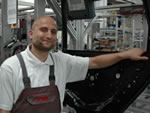 Born deaf and dumb, Mário Greško was left as an infant by his mother at an orphanage in rural Slovakia.
Born deaf and dumb, Mário Greško was left as an infant by his mother at an orphanage in rural Slovakia.
It was only at the age of six when he was moved to a school for deaf children that his long road to freedom and fulfilment could begin.
“I tell people I was born twice,” he says. “The second time was when I was six years old. Before that, I had no clear thoughts. My memories of that time are almost non-existent, only vague impressions. I know I played with other children. I could see their mouths moving and I knew that this was significant, but I was confused and didn’t understand what was happening. Almost nothing is left to me from those times.”
Getting over a rough start
Being moved to a special school meant Mário could learn and begin to form clear and specific ideas. “I learned to sign,” he says, “and that's when I start to have memories.”
Mário learned to read lips, and how to read and write. “I came to understand who and what I was,” he says, “how I am different, and I could hope for something better.”
When the time came, he moved to Bratislava, where he began work as a tailor’s apprentice. “Part of the curriculum at the deaf school was learning a trade,” Mário explains. “I did clothes making, so it was a logical thing to look in the tailoring sector. It was a start, but it wasn’t what I wanted to do for the rest of my life. My real dream was to work in the automotive industry. It’s simple, I just love cars.”
A new hope
A friend told Mário about a special IT training course for deafs, co-funded by the EU through the European Social Fund. The ‘EQUAL’ course included information about new software tools and online services for the deaf.
“Deaf-mutes face specific problems related to language,” says EQUAL project coordinator Milan Ručkay. “It isn’t a simple question of translation. Written language is completely different conceptually when compared to signing. Reading and writing are symbolic acts; letters in a word correspond to sounds, words correspond to things, actions and concepts. We see letters and words and we hear them in our minds. But a deaf-mute hears no words." Ručkay says signing is more like describing something physically with your hands. "It is its own language, with a particular syntax and grammar.”
During his training course, Mário learned about online services that are available to help non-hearing individuals, for example to better understand written information. Mário finally decided to invest in a laptop computer. “It was the best thing I ever did,” he says. “Knowing how to use a computer and the internet opened all kinds of doors for me.”
Life in the fast lane
With new skills and a new sense of confidence, Mário began applying for jobs online, and he got one. He now works at the Brose company as an automobile assembly line operator. Brose is a longstanding manufacturer of components for the auto industry. Its Bratislava facility produces car door assemblies for the Volkswagen plant just a few kilometres away.
Mário isn’t the only deaf-mute on the Brose assembly line, explains Human Resources Manager Ediltrúda Makarová. “We have an open policy towards people with disabilities. We have deaf people and we have hearing people who are fluent in sign language and can help with translation when necessary. The fact is Mário is an excellent communicator, with or without words. We all manage to understand each other. He is an excellent and highly motivated worker, no different from anyone else on the floor.”
By any standard, Mário can be said to have overcome incredible odds, but he doesn't dwell on the past. At the age of 30, with a good job and a competitive salary, he is making a better life and a better future for himself. He says he'd like to move into a nicer apartment and is on the lookout for a potential marriage partner. “Only eligible females need apply.”
“Things have really changed for me,” he says. “Learning to work with a computer was a great move. I’m glad I got the chance to do it.”
